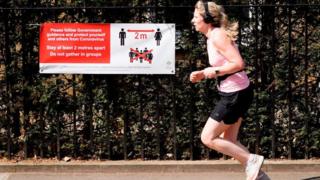- in Science
Science Coronavirus: ‘Severe consequences’ if lockdown lifted too early

Science
 Image copyright
Image copyright
Getty Images
Social distancing measures have been introduced to slow the spread of coronavirus
Lifting some lockdown restrictions too early could have severe consequences, Northern Ireland’s finance minister has warned.
Conor Murphy said he hopes the executive will publish a plan for “phased relaxation” in NI on Thursday.
It is more important to get it right than rush to meet deadlines, he added.
Twenty-four Covid-19 patients in NI are being treated in intensive care, the lowest number recorded since reporting began on 30 March.
The number peaked at 58 on 10 April.
On Wednesday, a further 14 coronavirus-related deaths in Northern Ireland were recorded by the Department of Health.
Science ‘Not driven by a date’
It brings the department’s total death toll, mostly comprised of hospital fatalities, to 418. Three of the deaths happened in the past 24 hours.
Speaking at the executive’s daily press conference, Mr Murphy said ministers were working intensively on a plan for easing some lockdown measures.
They must review the NI coronavirus regulations by Saturday.
“We understand people need hope for the future, but it’s not simply a matter of lifting restrictions,” said Mr Murphy.
Science Analysis: Delicate balance still needs to be struck
Louise Cullen, BBC News NI Health Reporter
The number of people in intensive care is an important indicator, but needs to be taken into consideration along with a number of other factors, including hospital admissions and new cases.
Admissions to hospital are also falling, but the number of in-patients is still fluctuating, as is the daily number of confirmed new cases.
Just 14% of those admitted to hospital with confirmed or suspected Covid-19 remain as inpatients.
What all this shows is that, thanks to our adherence to social distancing and movement restrictions, we have reduced the impact of the virus on our society.
What it does not show is just how delicately balanced that impact may be: any change to the way we’re currently living could yet have a catastrophic effect, and any move to ease restrictions still needs to be carefully managed.
Ministers and health officials are acutely aware of the challenge facing them.
“The consequences of doing this wrongly could have severe implications for people’s lives.
“While our intention is to have this ready for tomorrow, we are not driven by a date. I’m more concerned about getting it done correctly rather than rushing to meet a deadline.”
Image copyright
Getty Images
Pupils are likely to have a mixture of school and remote learning even when schools reopen, Peter Weir has said
On Tuesday, Deputy First Minister Michelle O’Neill said she wanted the executive to publish its blueprint on Thursday, rather than waiting for the British government to make its blueprint public first.
Education Minister Peter Weir said it would be the “most crucial decision” the executive would ever make.
He also told the press conference that there is “no planned date” for the reopening of schools in Northern Ireland for normal teaching.
Some schools have remained open during the pandemic, but only to provide care for children of key workers.
“Any decision will be guided by science and the health advice but it will not be date-driven,” said Mr Weir.
He added that it was likely when schools can reopen, there would be a phased return of pupils along with remote learning.
Prime Minister Boris Johnson is due to set out his own plans aimed at easing the Covid-19 lockdown this Sunday.
In other developments on Wednesday:
- The number of people claiming universal credit in Northern Ireland has almost doubled in two months because of the pandemic;
- Twenty-nine life-saving kidney transplants have been performed in NI over the past two-and-a-half weeks;
- Nurseries and childcare providers say they are facing “catastrophic” closures due to the outbreak;
- It’s been suggested that the government’s job retention scheme should be extended for airport ground staff to allow the aviation sector more time to recover
- The Department of Finance has said hospices in Northern Ireland will receive £6.75m to support them with the financial challenges they are facing during the crisis
Both ministers also expressed condolences with the families of the 14 coronavirus-related deaths announced on Wednesday.
Northern Ireland’s overall death toll will be higher when all deaths in the community are recorded.
The Department of Health publishes daily figures, which relate mostly to hospital fatalities, while a weekly report by the government statistics agency, Nisra, records all deaths where Covid-19 is mentioned on a death certificate.
Up to 24 April, the Nisra statistics had recorded 393 Covid-19-related deaths in Northern Ireland, with about 40% of them having taken place in care homes.
There have been 3,934 confirmed cases of the virus in Northern Ireland, with a further 53 positive cases confirmed since Tuesday.
The Department of Health’s latest statistics, updated each day on its interactive dashboard, show that there are currently 699 Covid-19 patients in Northern Ireland hospitals.
Across the UK, there have been 30,076 deaths, while in the Republic of Ireland the death toll stands at 1,375 after 37 new deaths were announced on Wednesday.
